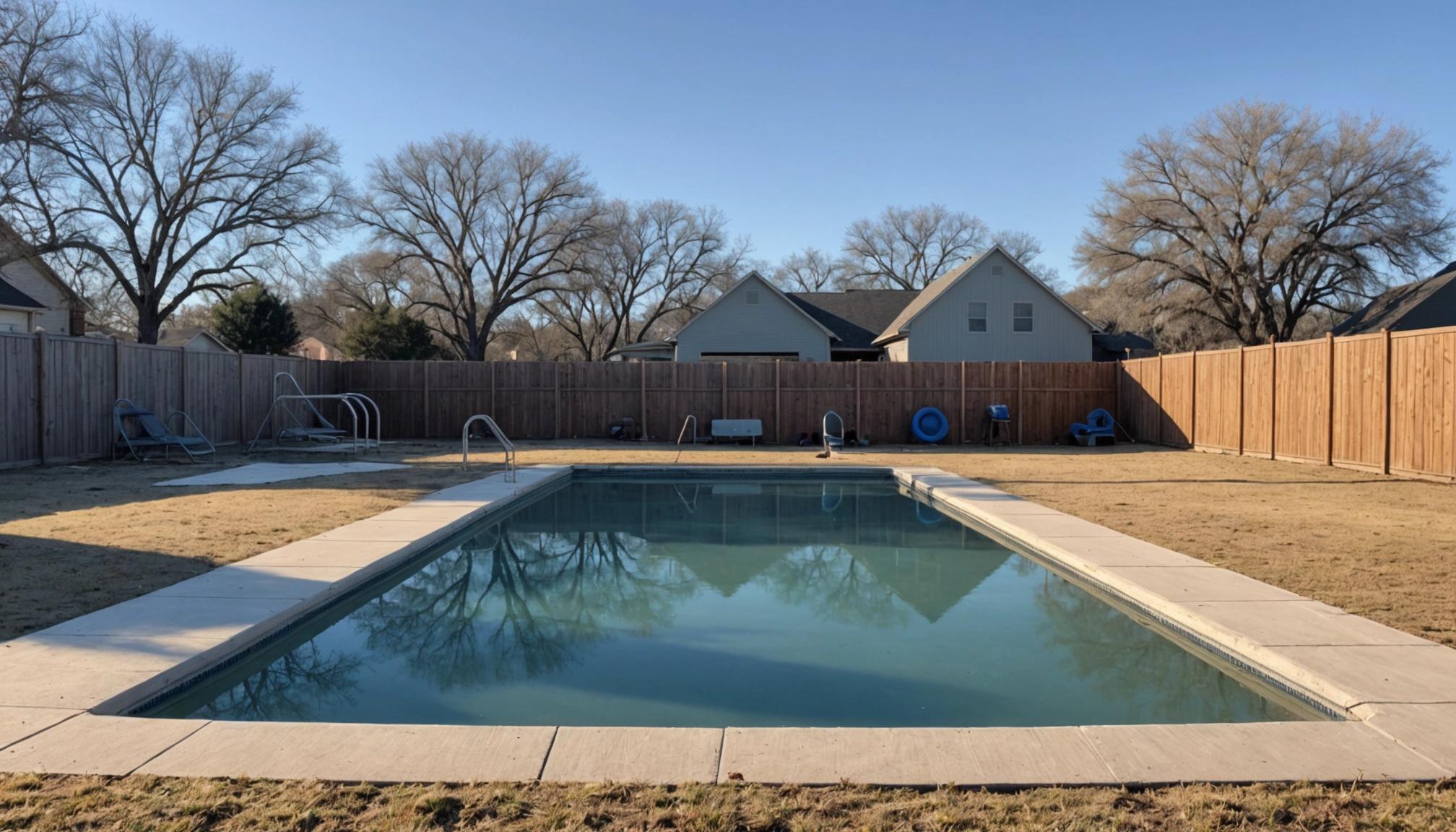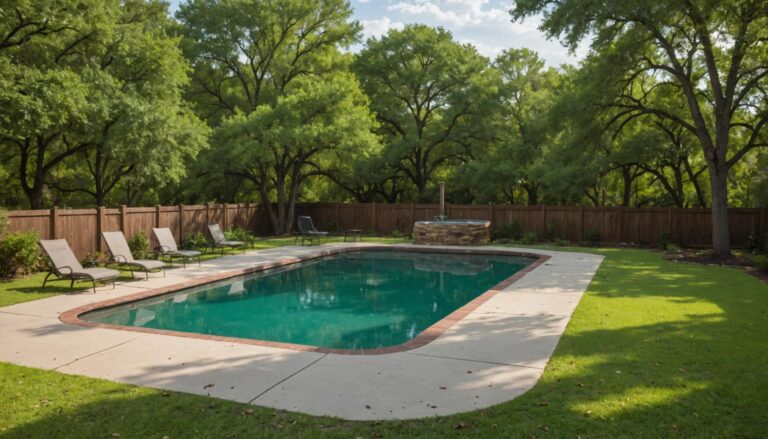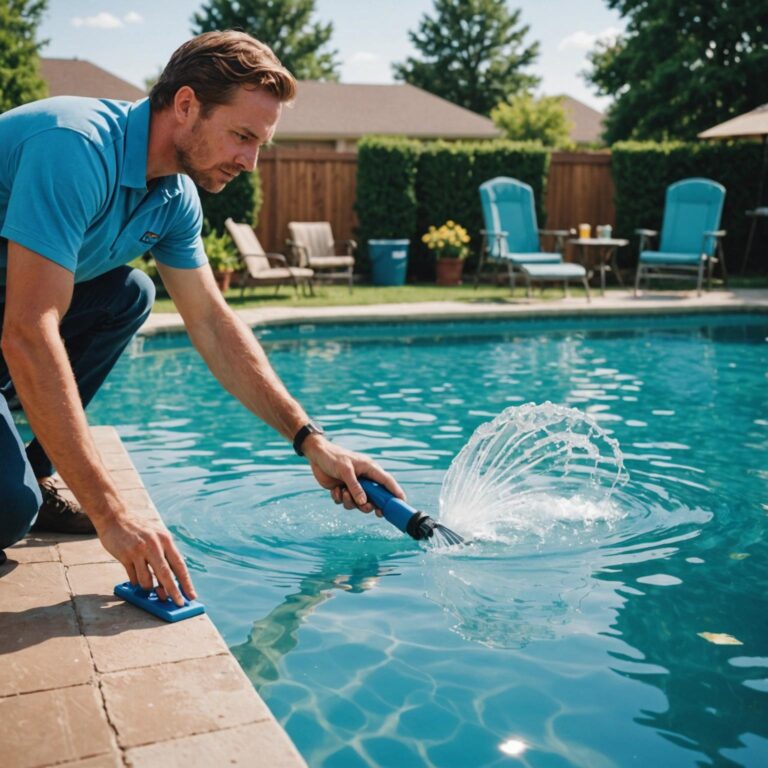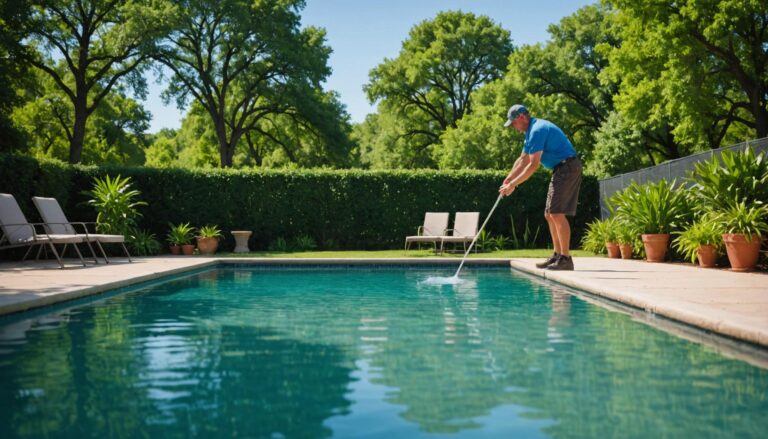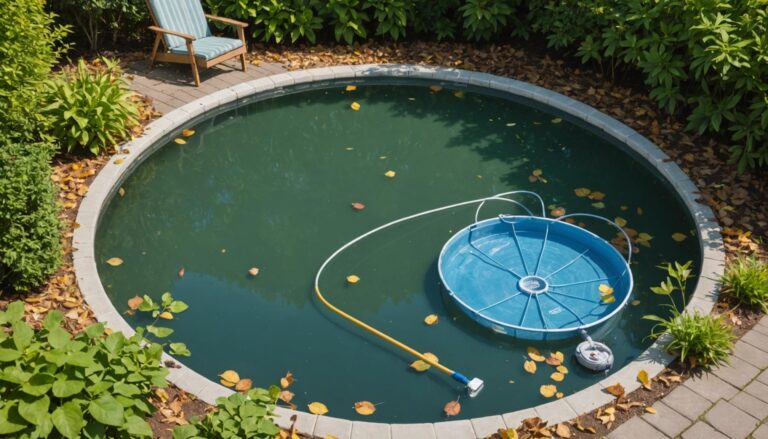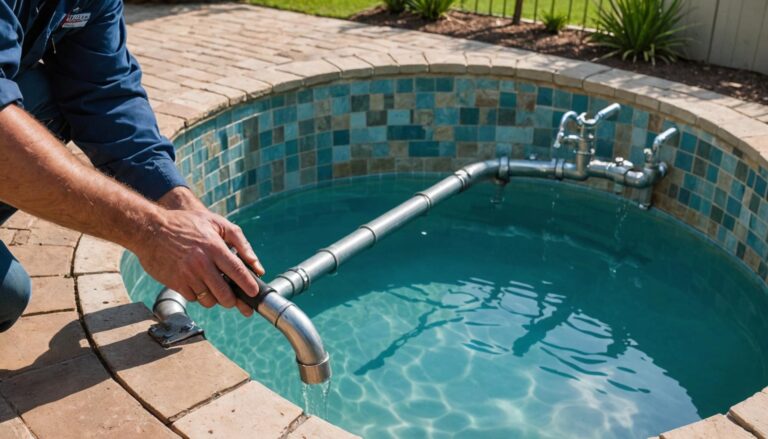Prevent Pool Pipes from Freezing in Texas Winters (How-To Guide)
Are you concerned about how to prevent pool pipes from freezing in the unpredictable Texas winters? At Blue Shade Pools, we’ve got the expertise to keep your pool running smoothly even when the temperatures drop. Winter in Texas may not be famous for its snow and ice, but those sudden cold snaps can wreak havoc on an unprepared pool system, leading to frozen pipes and costly repairs.
In this comprehensive how-to guide, we’ll share practical tips on insulating pool pipes, protecting essential equipment, and preparing for unforeseen freezes. Whether you’re a pool novice or a seasoned pro, dive into our expert advice to safeguard your investment and keep your backyard oasis in pristine condition all winter long. Let’s get started and make sure those pool pipes weather the worst that Texas has to offer!
What Are the Main Risks of Pool Pipes Freezing in Texas Winters?
Even in Texas—where winters are generally mild—temperatures can dip unexpectedly. When this happens, pool pipes are at risk of freezing. Freezing temperatures can create major headaches for pool owners.
The primary concern? Pipe DAMAGE. When water inside the pipes freezes, it expands. This expansion can lead to cracks or breaks in the pipes, resulting in costly repairs. In severe cases, entire sections of plumbing might need replacement, as discussed in pool plumbing repair solutions in Watauga, TX.
There’s also the risk of equipment failure. As the pipes freeze, this affects water flow, potentially damaging your pool pump, heater, and filtration system. These components are critical for maintaining clean, safe water.
In the worst case, a complete pool system shutdown could occur, leading to even more extensive and expensive fixes. It’s important to proactively protect your pool to avoid these possible outcomes.
Next, we’ll cover how to properly insulate your pool pipes and protect your investment from winter’s chill.
How Can I Insulate Pool Pipes for Winter Protection?
Protecting your pool pipes from freezing temperatures is essential, especially in a place like Texas where winters can be unpredictable. Insulating your pool pipes not only prevents costly repairs but also keeps your pool system running smoothly throughout the winter months. Here’s a step-by-step guide to help you get started:
- Use Foam Pipe Insulation: This is one of the easiest and most effective ways to insulate pipes. Simply purchase foam pipe covers from your local hardware store and wrap them around the exposed pipes. Make sure to secure with duct tape or cable ties for added protection.
- Apply Heat Tape: Heat tape can be wrapped around both metal and plastic pipes to provide warmth. This is especially useful for extremely low temperatures. Follow the manufacturer’s instructions carefully to ensure safety and effectiveness.
- Wrap Draining Valves and Connections: Any valves or connections that are exposed should be securely insulated. Use foam tape or insulation blankets to cover these areas fully, making sure they’re sealed tightly.
- Install Pool Cover: While it’s primarily for keeping debris out, a pool cover can also help maintain water temperature. Using a pool cover reduces heat loss and can indirectly help prevent the pipes from freezing.
- Seal Cracks and Gaps: Check the vicinity of your pool for any cracks or gaps where cold air might enter. Use caulking or expanding foam to seal these areas and protect your plumbing from chilling winds.
Taking these precautions can save you time, money, and hassle by keeping your pool pipes well-insulated during winter. If you encounter any issues or need professional pool plumbing repair in Southlake, TX, a little effort now can ensure your pool is ready to enjoy when warmer weather returns.
What Types of Pool Equipment Need Special Attention in Cold Weather?
Preparing your pool for cold weather means focusing on certain key pieces of equipment. During freezing temperatures, neglecting these can lead to damage and costly repairs. Let’s explore which equipment needs your attention during winter.
Pool Pumps
The pool pump is the heart of your system. If it freezes, the entire circulation system can get disrupted. Make sure to keep it running to prevent water inside from freezing—just a low-speed continuous run should suffice.
Filters
Filters hold water and, if left unattended, can suffer from ice buildup and cracking. Ensure to drain the filter or keep it covered with a thermal blanket for added insulation.
Heaters
Protecting your pool heater is crucial. Check that all components are covered or insulated properly. Running the heater occasionally can keep internal parts from freezing up.
Skimmers and Return Lines
These lines are vulnerable to cracking if water inside them freezes. Make sure to remove water from the skimmer and seal it off, and insulate the return lines. For more detailed guidance on maintaining your pool’s plumbing system, consider visiting pool plumbing repair services.
Automatic Water Fillers
These can freeze and crack if they contain water during a freeze. Drain these systems or ensure they are insulated appropriately against cold weather.
By paying special attention to these components, you can help ensure your pool system remains intact and functional throughout the winter months. Proper maintenance can save both time and money in the long term.
How Do I Prepare My Pool for an Unexpected Freeze in Texas?
Texas winters can be unpredictable. A sudden freeze can catch you off guard—especially when it comes to pool maintenance. To prevent any damage to your pool, it’s ESSENTIAL to be prepared. Here’s a quick guide to help you get your pool ready for unexpected icy weather.
- Keep the Pump Running: Continuous water movement can prevent pipes from freezing. Set your pool pump to circulate water during freezing conditions.
- Insulate Pipes: Wrap exposed pipes with insulating materials. Foam insulation or even old blankets can offer protection against the cold.
- Maintain Water Level: Ensure your pool has enough water to keep the pump primed—typically halfway up the skimmer box. This helps the pump maintain functionality.
- Check for Leaks: Inspect the pool and equipment for any leaks. Even small drips can freeze and result in costly repairs.
- Cover Your Pool: Use a pool cover to minimize water evaporation and retain warmth within the pool’s surface.
- Add Antifreeze: Add pool-safe antifreeze to your plumbing lines to provide extra protection against freezing temperatures.
- Monitor Weather Reports: Keep an ear to the ground (or eye on the app) for upcoming freezes so you can act promptly.
Implementing these steps can help safeguard your pool against unexpected cold snaps, avoiding potential damage and costly repairs. For more detailed tips on how to prevent pool pipes from freezing in Texas winters, stay prepared and keep your pool secure throughout the winter season.
What Are Some Emergency Measures if Pool Pipes Are Already Freezing?
When Texas temperatures take an unexpected nosedive, you might find your pool pipes on the brink of freezing. If this happens, quick action can save you from potential damage. Here’s what to do if you notice your pool pipes starting to freeze:
- Apply Heat Gently: Use a hairdryer or heat lamp to gently warm the pipes. Avoid open flames or high heat sources—they can cause pipes to crack.
- Insulate Immediately: If parts of the pipes are still warm, add insulation. Pipe sleeves or old towels can work in a pinch to offer some protection against the cold.
- Open Valves to Release Pressure: If it’s safe, open faucet valves slightly to keep water flowing. This helps relieve pressure and prevent further freezing.
- Use a Pool Cover: Keep the pool covered if possible. This helps retain warmer temperatures in the water, protecting the pipes from further exposure.
- Check and Maintain Pool Equipment: Ensure the pool pump is running; moving water is less likely to freeze. Also, check that the filters and heaters are functioning correctly.
- Contact a Professional: If you’re unable to manage the situation, or if significant ice has formed, call a pool service professional immediately for assistance.
Taking these steps can prevent serious damage. Being proactive when temperatures dip might just save your pool and your wallet from unnecessary repairs. For more detailed strategies, consider exploring how to protect your pool in winter.
How Can I Maintain Pool Temperature During Freezing Conditions?
Keeping your pool at a stable temperature during a freeze is critical to prevent damage and ensure continuous use. While heating options are available, it’s important to understand several methods to effectively manage pool temperature without breaking the bank.
Using a Pool Cover
A pool cover is your first line of defense against heat loss. It acts as a barrier, trapping heat and preventing water from freezing. Choose a cover specifically designed for winter conditions for optimal performance.
Installing a Pool Heater
For those cold Texas nights, a pool heater can make all the difference. Although it’s an investment, pool heaters provide consistent temperature control. Options range from gas, electric, to solar-powered units—each with its own cost and efficiency considerations.
Circulating Water Regularly
Moving water is less likely to freeze. By running your pool pump regularly, you keep the water circulating, which maintains temperature and reduces freezing risk. Set your pump to cycle during the coldest parts of the day (like early morning and late night).
Using Liquid Pool Covers
If a physical cover isn’t feasible, consider a liquid pool cover. This innovative solution forms a microscopic barrier over your pool, reducing heat loss and evaporation without the hassle of handling bulky covers.
Maintaining Proper Chemical Balance
Keep the chemical levels in check. Ensure your pool’s pH, alkalinity, and calcium hardness are balanced to prevent corrosion and scaling, which can be exacerbated by temperature fluctuations. For a comprehensive understanding of maintaining your pool during winter, consider exploring this Texas winter pool maintenance guide.
Implementing these strategies not only helps maintain your pool’s temperature but also protects your equipment and extends the life of your pool system through those chilly Texas winters.
Conclusion
Shielding your pool pipes from freezing during the unpredictable Texas winters is essential for maintaining the longevity and efficiency of your pool system. By implementing strategic steps such as insulating pipes, maintaining proper water levels, and ensuring your pool equipment is in good working condition, you can safeguard your investment and enjoy uninterrupted swimming seasons.
For exceptional service tailored to your pool’s specific needs, trust Blue Shade Pools. Whether it’s pool plumbing repair, equipment maintenance, or regular cleaning services, our team led by Joao Contessoto is ready to help. We proudly serve the Fort Worth area and its surrounding communities including Hurst, Keller, and Arlington. For professional assistance, reach out to us at 817-770-9524 or email us at info@blueshadepools.com. Let us ensure your pool is winter-ready, giving you peace of mind all year round.

